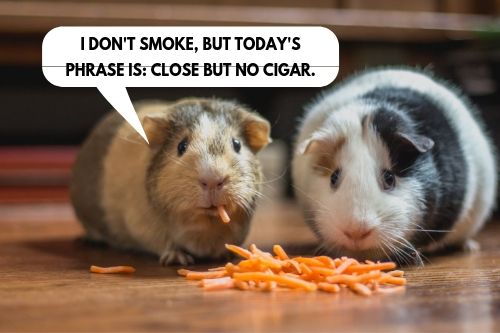
YouTube / iTunes / Spotify / Radio Public / Pocket Casts / Google Podcasts / Breaker / Overcast
Listen to ArtisanEnglish.jp posts & lesson intros here.
Phrase: Close but no cigar
If you think I’m an American, I have to say you’re close, but no cigar.
I am, of course, Canadian from the true north, strong and free.
Although my roots are not in the United States of America, today’s phrase does originate in the good old U.S. of A.
In the early 1900s, games of chance at fairgrounds or carnivals gave out cigars as prizes.
Those games were the type where you have to throw a dart at a target or shoot a moving duck figure.
These days, popular prizes are plush dolls or plastic toys.
Back in the day, if you almost hit the target, a common phrase from one of the carnies would be close but no cigar.
Although cigars are no longer given out as prizes, the phrase is still used today to mean that you have almost been successful but not completely.
For example, the National Basketball Association (NBA) and National Hockey League (NHL) final playoff series are taking place.
If a basketball player shoots but hits the rim or a hockey player takes a shot and hits the post, you may hear someone say close but no cigar.
It means the player tried to score and was almost successful but not quite.
You could even hear it in the office.
I’m sure you’ve seen someone ball up an old piece of paper and shoot it at the wastepaper basket.
If it goes in, they may say, “Two points!” but if it stays out, you may hear someone say, “Ah, close but no cigar.”
It’s a handy expression which you can use daily in various situations.
The next time a friend of yours fails to achieve the TOEIC score they were hoping for, remember to say, “Close but no cigar.”
Then please give them my email address and tell them to contact me.
Flesch-Kincaid Readability Test
This post is understandable by someone with at least a 7th-grade education (age 12).
On the Flesch-Kincaid reading-ease test, this post scores 76.
The easier a passage is to read, the higher the score on a scale of 0 – 100.

